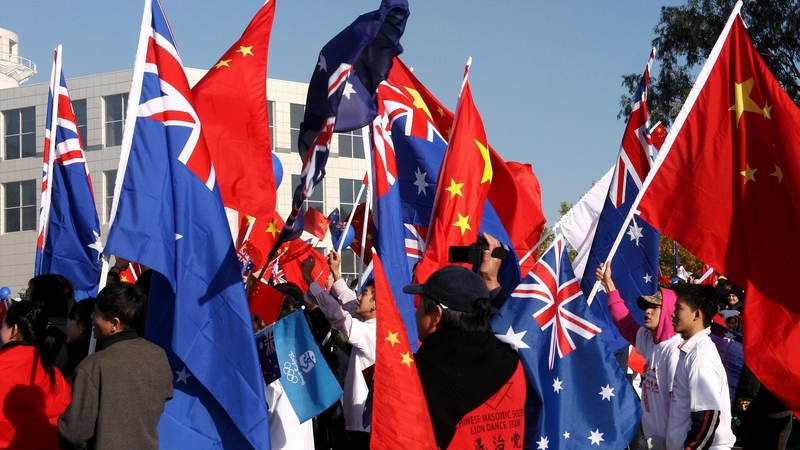China is still Australia’s trade frenemy
May 24 2022

Note: This article appeared in 360info on May 24 2022.
Despite rising geopolitical tensions the evidence of a correlation between political talk and economic connections between trading nations is often overdone.
For politicians seeking soundbites it’s easy to espouse a global narrative that sees liberal democracies valuing ‘freedom’ pitted against countries where ‘autocracy and authoritarianism‘ dominate.
In the wake of Russia’s decision to invade Ukraine, this narrative was given a shot in the arm, bolstered by the cohesion, speed and scale of economic punishment unleashed on Russia by the West, along with some partners in Asia, including Japan and Taiwan.
A less prosecuted but equally simplistic portrait being painted is that current geopolitical division will realign trade and investment patterns because, in the words of former Australian Prime Minister Scott Morrison, ‘global economics is downstream from global politics‘.
For Morrison, Beijing being unwilling to condemn Moscow’s recent actions, continuing to buy Russian wheat, and earlier decisions including refusing to abide by a 2016 tribunal judgement on its activities in the South China Sea, firmly qualified it for inclusion in an ‘arc of autocracy‘.
When asked about the potential for economic sanctions on China as well as Russia, Morrison, rather than emphasise a lack of evidence for Beijing providing Moscow with military support, or offering it assistance in evading Western sanctions, instead responded, ‘We will move in lockstep with our partners and allies on these issues’.
Yet the reality is that unless Beijing flagrantly crosses these thresholds, or launches its own military offensive on Taiwan, any economic decoupling from China will be limited, even with greater geopolitical distance from the West.
This is mostly because while Western leaders are frequently happy to ramp up ‘tough on China’ rhetoric for domestic political purposes, they are reluctant to take policy steps that would retard economic engagement with China. This would harm their own country’s self-interest.
Meanwhile, for most countries outside the West, the binary of democracies versus autocracies simply does not ring true. Nor are they inclined to participate in economic sanctions, even in face of developments as egregious as Russia’s latest moves. And with a primary focus on development, their interest in disconnecting from the growth engine of China’s economy is close to zero.
It is one thing to cut economic ties with Russia, which accounts for 3 percent of global GDP, and is the world’s 16th largest exporter and 21st largest importer. It is another thing entirely to contemplate doing so with China, which has a global economic weight of 19 percent, and ranks as the world’s largest exporter and 2nd largest importer.
As a result, even in Western capitals, the default has been to talk loudly about market diversification and the benefits of forging closer ties with ‘trusted partners’, while only fiddling around the edges in terms of policies that would put greater economic distance between themselves and China.
In March, for example, while Morrison warned that an Australian business should not ‘put all of its eggs in one basket’, in the following breath he acknowledged that, ‘ongoing engagement between private industry and business with markets like China is very important and I would continue to encourage that’.
Even diversification, a far cry from decoupling, is not easily achieved given patterns of international trade and investment are driven by economic fundamentals like purchasing power and production complementarities, not bureaucratic manoeuvres like striking free trade agreements with geopolitical friends.
Australian businesses with exposure to China are cognisant that their operations can fall victim to geopolitical fallout. Yet for those at the coalface of this economic engagement, geopolitical fallout is only one risk they must manage. Oftentimes it is far from the most significant and/or can be readily mitigated. The residual level of risk still then needs to be compared with the opportunities on offer in China versus elsewhere.
Premium Australian wine-maker, Treasury Wine Estates (TWE), provides a useful case study. After Beijing placed prohibitive tariffs on Australian wine in late 2020, TWE was able to maintain deep connections to the lucrative Chinese market by sourcing more of its offerings from California and boosting its investments in vineyards in China’s Ningxia region.
The result is that at an aggregate level at least, the correlation between economic connections and shifts in geopolitical tensions tends to be weak.
In 2016, Australia’s goods trade with China totalled US$106 billion, accounting for 28 percent of total Australian trade. Despite the subsequent geopolitical falling out between Canberra and Beijing, this increased to US$183 billion and 31 percent in 2021.
Or consider Taiwan. In 2016, goods trade with the mainland in 2016 was US$118 billion, or 23 percent of the total. Despite being threatened with invasion by Beijing, by 2021 these figures stood at US$209 billion and 25 percent.
Even the case of the US, despite China being its arch geopolitical rival, and both sides throwing much sand in the wheels in the form of tariffs and other restrictions, trade still rose from US$597 billion in 2016 to US$693 billion in 2021.
Peer-reviewed research by Australian National University scholars Vishesh Agarwal and Jane Golley reveals that shocks in political relations between the ‘Quad’ countries (US, Japan, India and Australia) and China have had no consistent and statistically significant impact on overall trade values.
Of course, the relationship can be tighter at a firm or industry level. It is on this level that headlines tend to concentrate, leading to skewed perceptions of just how extensive the link is.
And if China crossed either of the thresholds mentioned earlier, then even at an aggregate level the association between geopolitical tension and trade is likely to strengthen.
Or if the Chinese economy lost its dynamism, this would also cause businesses overseas to shift their attention elsewhere.
But in the absence of such scenarios, the gap between the reality and the narrative of tightening geopolitical alignment in the West leading to greater economic distance from China, will be vast.
Professor James Laurenceson is Director of the Australia-China Relations Institute at the University of Technology Sydney.

